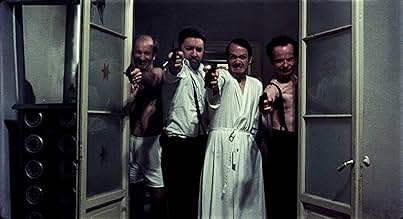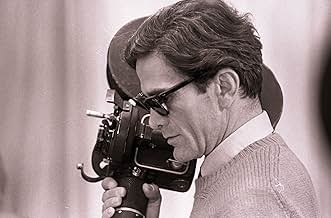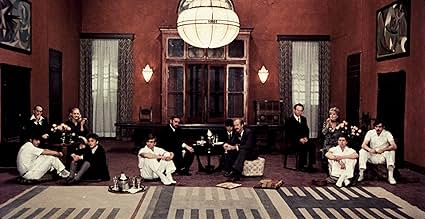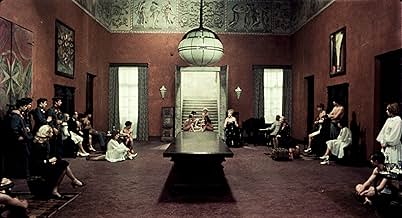
Play clip3:12
Watch If You Liked Terrifier 3, Watchlist These Endurance Horror Classics
In World War II Italy, four fascist libertines round up nine adolescent boys and girls and subject them to 120 days of torture.In World War II Italy, four fascist libertines round up nine adolescent boys and girls and subject them to 120 days of torture.In World War II Italy, four fascist libertines round up nine adolescent boys and girls and subject them to 120 days of torture.
- Awards
- 1 win
Uberto Paolo Quintavalle
- Eccellenza
- (as Umberto P. Quintavalle)
Hélène Surgère
- Signora Vaccari
- (as Helene Surgere)
Storyline
Did you know
- TriviaDespite the grim subject throughout the film, in an interview on the second disc of the Criterion Collection box set, actress Hélène Surgère claimed the mood was actually rather jovial on the set and that none of the teenage actors were actually harmed or traumatized. She said the abundance of teenagers who had never acted before led the mood to be happy and at times, even fun, with the cast often playing practical jokes on each other. She also said that the movie was literally "made" in the editing room and the filmmakers had no idea how grim a movie it was until they saw the finished product at the premiere.
- GoofsWhen the Duke kisses several victims during Sergio and Renata's wedding, some victims and Ezio begin to laugh, off the character.
- Crazy creditsEssential Bibliography: Roland Barthes: 'Sade, Fourier, Loyola' (Editions du Seuil); Maurice Blanchot: "Lautréamont et Sade' (Editions de Minuit; in Italy Dedalo Libri); Simone de Beauvoir: 'Faut-il brûler Sade' (Editions Gaimard); Pierre Klossowski: 'Sade mon prochain, le philosophe scélérat' (Editions du Seuil; in Italy SugarCo Edizioni); Philippe Sollers: 'L'écriture et l'experience des limites' (Editions du Seuil)
- Alternate versionsThe film was rejected for cinema by the BBFC in 1976 and a private showing of the uncut version at the Old Compton Cinema Club in London's Soho resulted in a police raid and confiscation of the movie. A heavily edited version - minus 6 minutes of footage including scenes of torture, homosexuality and excrement eating, and including a 4 minute prologue describing the history of the town of Salo - was later prepared by UK censor James Ferman for club showings. The film was finally passed completely uncut for cinema and video in the UK in December 2000.
- ConnectionsEdited into Histoire(s) du cinéma: Une histoire seule (1989)
- SoundtracksPrelude in C minor
(uncredited)
Composed by Frédéric Chopin (uncredited)
Played by Arnaldo Graziosi (uncredited)
Featured review
This is on the list of most disturbing movies ever. But it's not disturbing for the sake of it. There is an underlying exposition of a fascist government and it's ability to control to the most depraved extremes. I don't need to go into the plot, just don't watch if your skin crawls easily.
Apparently based loosely on the Marquis de Sade's eponymous story, it feels dirty...it feels icky. You will not finish the film feeling happy, relieved, redeemed, or satisfied. You will feel that humanity is capable of terrible things and sometimes for no real reason other than they can. It shows what happens when people blindly follow terrible people and abandoned their own sense of decency. The following orders defense will never work. When you've become an accomplice you ate equally guilty.
This movie has depth, but it's not an easy watch. It's not for a simple eve with a date. I can't imagine watching this with anyone other than fellow film students or a significant other you've been with for years.
Apparently based loosely on the Marquis de Sade's eponymous story, it feels dirty...it feels icky. You will not finish the film feeling happy, relieved, redeemed, or satisfied. You will feel that humanity is capable of terrible things and sometimes for no real reason other than they can. It shows what happens when people blindly follow terrible people and abandoned their own sense of decency. The following orders defense will never work. When you've become an accomplice you ate equally guilty.
This movie has depth, but it's not an easy watch. It's not for a simple eve with a date. I can't imagine watching this with anyone other than fellow film students or a significant other you've been with for years.
Details
- Release date
- Countries of origin
- Languages
- Also known as
- Saló o los 120 días de Sodoma
- Filming locations
- Production companies
- See more company credits at IMDbPro
Box office
- Gross worldwide
- $1,808,595
- Runtime1 hour 57 minutes
- Sound mix
- Aspect ratio
- 1.85 : 1
Contribute to this page
Suggest an edit or add missing content


![Trailer [OV]](https://m.media-amazon.com/images/M/MV5BYTczYWExODUtNmQ3NC00MzRhLTkwMGQtNzRjM2M5ZGQzYmVkXkEyXkFqcGdeQXRyYW5zY29kZS13b3JrZmxvdw@@._V1_QL75_UX500_CR0)

























